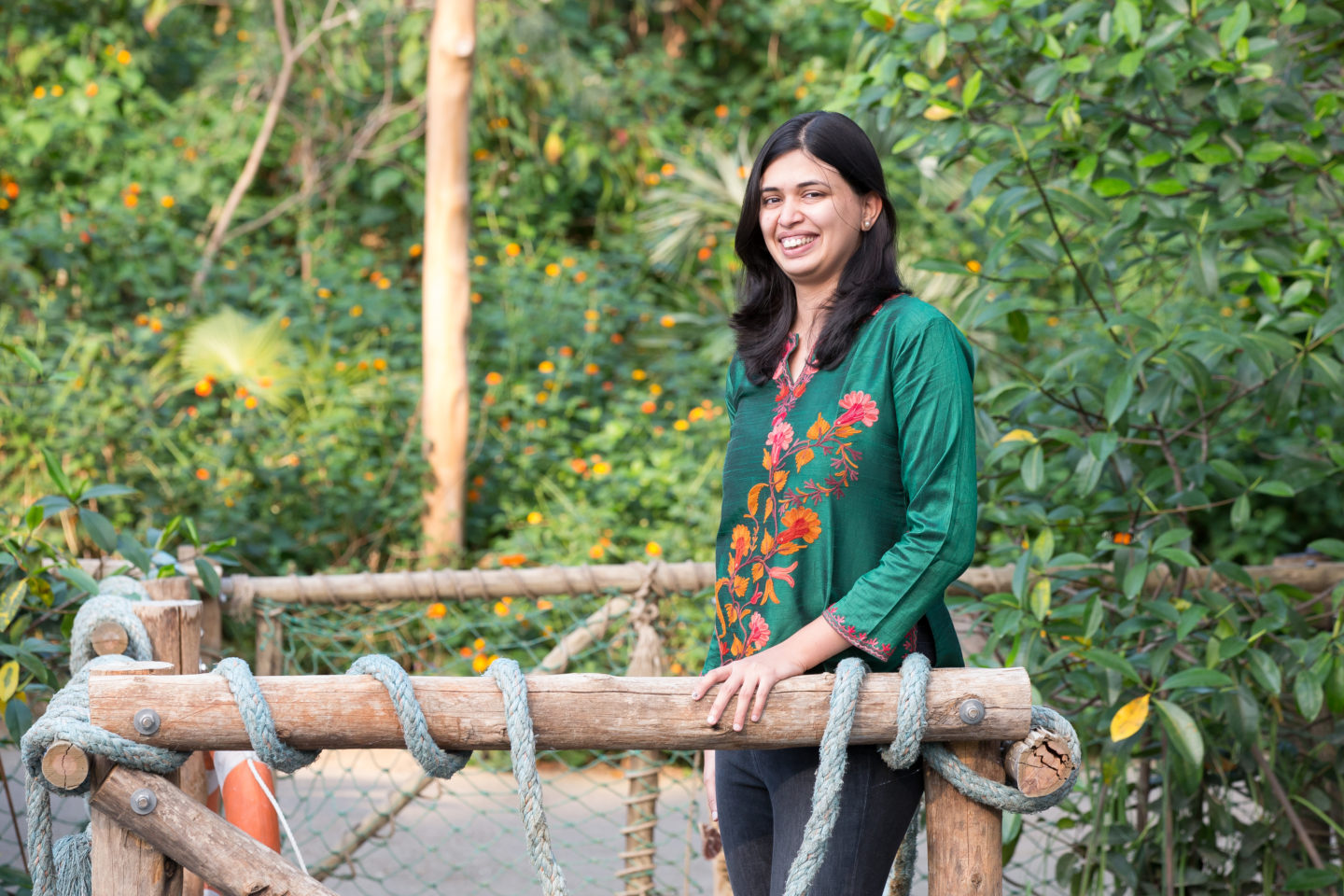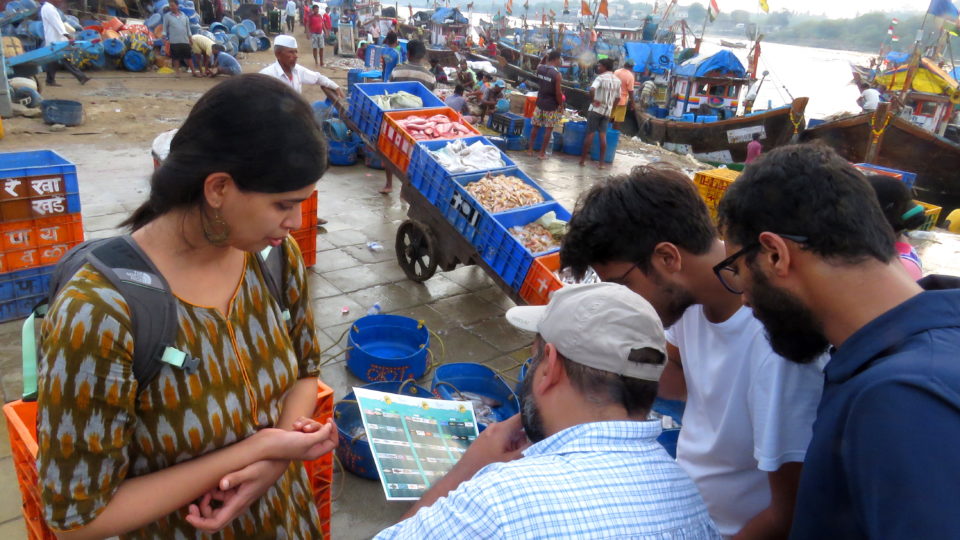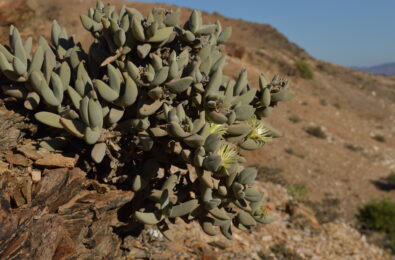The Shark is at Risk of Extinction in India, Divya Karnad (34) Wants to Prevent this

Translation of the Trouw newspaper, original article written by Ilona Bos, published on the 6th of May 2019.
The shark is at the brink of extinction in the Indian coastal waters. Conservationist Divya Karnad is trying to avoid this by raising awareness amongst fishermen and chefs. That is why she is awarded.
The beaches of the Indian islands used to be scattered with sawfish noses, or carpenter sharks. Around 1800, the Indian waters were filled with these sharks. Fishermen would cut their noses – shaped like small chain saws – and dump them on the beach whilst taking the rest of the meat to sell as food. Nowadays things are completely different: if a sawfish is spotted, it is featured in newspapers.
The Indian conservationist Divya Karnad (34) is fighting for the continued existence of sharks. That is why last Friday she received the prestigious Future For Nature Award in Burgers’ Zoo in Arnhem, an international prize for young conservationists. This award is an initiative from the Dutch foundation Future For Nature, of which Burgers’ Zoo director Alex van Hooff is chairman.
Karnad emerges from the tree houses in the Safari Meeting Center in Burgers’ Zoo. It is an exciting week for her: this award is the first time she will speak to such a big audience – 500 people. Modest and with a big smile on her face she starts her story.
Sharks, says Karnad, are not just hunted for their fins in Chinese shark fin soup. That is illegal in India. But what is allowed, is catching a shark and eating it whole. Puttu, mashed up shark or minced shark, is known as a delicacy in Southern Indian fishing villages. It is a century old tradition. Shark has emerged on restaurant menus for a few years. Spiced shark on a stick is wildly popular. Chefs and fishermen work together in this. Fishermen are eager to sell sharks, but their meat has a strong taste and is difficult to prepare. Which is why fishermen teach chefs how to process their meat.
Not only fishermen and chefs contribute to the extinction of the shark, Karnad tells. According to her, the government is taking insufficient action to protect this animal. From all shark species, only six or seven are on the endangered species list in India. This list is outdated. Now there are a lot more shark species that are threatened. The government should act against that.
Moreover, fishermen often do not recognise the endangered species. “Even for experts, they are at times hard to identify”, Karnad explains. If a fisherman is deliberately catching endangered sharks, he will sell them in parts on the market. No one would recognise them anymore. Changing this Indian mentality, the traditions and the culture, seems impossible. But it is possible, as Karnad shows. And fisherwomen have the key in their hands.
“Fisherwomen have the key to fight against the extinction of sharks”.
Undesired
The role of fisherwomen became apparent to Karnad when she was younger. She noticed it when she would travel on the bus in the coastal city she grew up in. “India is crowded. In the bus people are crammed. It is at these moments, that men take their chances to touch women inappropriately. To assault them. It happens almost daily, that it is accepted in India. Nobody helps out, nobody says anything about it. Except for the fisherwomen”.
The fisherwomen are not stronger than other Indian women, according to Karnad. But they live with other cultural norms and values. They are not subordinate to men, but dare to stand up for themselves. It is the women who sell the fish on the market and handle the money. That is a completely different division of roles between men and women compared to the rest of India. Karnad: “If a man would touch me on the bus, I would go to these women. They would stand up for me.”
Later, during her study in marine biology, when Karnad discovered sharks were slowly going extinct, she found herself in a dilemma. She did not want to take away from the fisherwomen, who used to help her, their income and traditions. At the same time, she wants her children to be able to see sharks alive in the future. Which is why she founded her organisation ‘InSeason Fish’. Together with the government, restaurants and the fishing industry, they try to break the rusted system of demand and supply in shark trade.
First Karnad convinced chefs from different restaurants to no longer put sharks on their menus. Instead they would work with a changing menu from season bound fish. On her website it states exactly which fish you should catch during which season and at which location. For instance, this month chefs could perfectly make a dish with sardines, as it is not spawning time. Tuna, on the other hand, should better be left alone at this time of the year.
Karnad also approaches fishermen, who were reluctant at first. A kilo of shark is worth 300 rupees, which is about 4 euros. And a big shark fin could easily harvest 1500 rupees, 20 euros. It is their life.
But still, Karnad regularly rises before dawn to go to the docks to see what fishermen caught in their nets that day. She addresses them about it. “Fishermen often show how pleased they are with catching sharks. I try to explain them that some restaurants prefer not to have them on their menu.” When the fishermen do not believe her, she brings a chef the next time to convince them.
“The disappearance of the shark has its repercussions on the whole ecosystem.”

Reproduce
Karnad teaches the fishermen that it will impact themselves if they continue like this. Most sharks reproduce differently compared to fish. Whereas a teleost lays hundreds of eggs in the sea, baby sharks – depending on their species – usually grow inside their mothers. There is only room for about six or seven youngsters. Reproduction is slow, and at this rate, more sharks are disappearing than are developing.
The disappearance of the shark has repercussions on the whole ecosystem, Karnad explains. Sharks control the growth of sea turtles. These animals would otherwise consume all the sea grass, which is needed by other fish populations. This could put the survival of fish populations in jeopardy. So without sharks, no fish. The Indian island close to the Maldives is a good example, Karnad says. The sea is empty there. And with empty seas the question arises for how long the fishing profession will continue to exist.
Slowly but surely awareness is raised amongst fishermen, chefs and consumers, Karnad notices. She often hears: “I did not even know this about the shark.” She educates young chefs in their training programmes. She reaches consumers via social media. And in the meanwhile 20 restaurants in two big cities have removed sharks from their menu. With the Future For Nature award prize money, €50.000, she hopes to reach more restaurants, fishermen and consumers. She also aims to realise the SharkWatch program, to map the extent of shark bycatch.
Karnad sees dead sharks on a daily basis, but it gives her strength to fight. “It is sad. Yesterday, in Burgers’ Zoo I saw a live hammerhead shark for the first time. That is crazy right?”
Other Awardees
Rwandan Olivier Nsengimana (34) and Brazilian Fernanda Abra (33) are the other recipients of the Future For Nature Award.
Nsengimana is a national guardian for the endangered Grey Crowned Crane. With his love for Rwandan nature, he aims to stop the illegal trade and raise awareness. Together with his team, he teaches local communities about the benefits of a healthy ecosystem.
Abra fights for wild animals living next to Brazilian highways, often victims of speeding cars. The mortality rate negatively impacts Brazilian biodiversity. Strategically building (animal) highways will be the solution.

Credits: Theo Kruse
Protection of the Shark in the North Sea
The sharks and rays in the North Sea are also threatened. Still too often sharks end up as bycatch in fishing nets. Last Wednesday, Minister Schouten from Agriculture, Nature and Food quality decided on an action plan: together with Rijkswaterstaat (Ministry of Infrastructure and Water Management) she aims to investigate the habitats of shark populations in the North Sea, so fishermen know which areas to avoid.

















